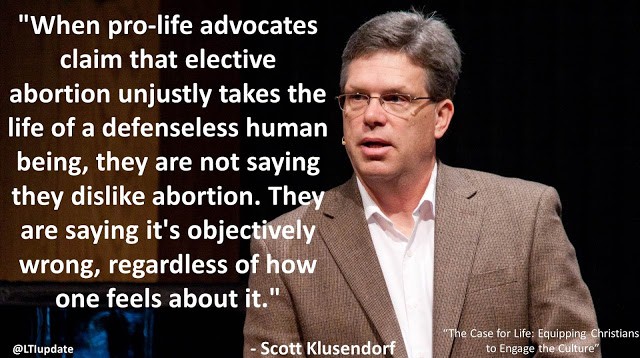By Terrell Clemmons
Phelim McAleer was in Pennsylvania in early 2013 doing a series of screenings of his film FrackNation. As he often did when travelling, he checked the local paper for interesting court cases underway, and a case concerning a doctor in Philadelphia caught his attention. And so it happened that on one of his days off, he walked into the courtroom where abortionist Kermit Gosnell was standing trial for a slew of charges including (but not limited to) murder, infanticide, and multiple violations of state abortion law.

Phelim had seen a lot in his twenty-five years in journalism (he started his career in a part of Northern Ireland known as “Bandit Country”), but the evidence he saw that day in Room 304 of the Philadelphia Justice Center surpassed anything he’d previously encountered. The photos displayed up on a big screen—pictures of well-formed babies, some of whose necks had been snipped with scissors after live birth—were more horrific than anything he’d ever seen. All of this was shocking in itself, but what was even more astounding to him as a journalist was that the press gallery behind him was completely empty. There were no national journalists covering this case. Not one. How could this be?
He returned home to Los Angeles and told his journalist partner and wife, Ann McElhinney, that he had found the next project they would work on. At first, Ann wanted nothing to do with it. This subject was foreign territory for them, way outside their wheelhouse. Besides, both she and Phelim had always considered themselves neutral on abortion. Why venture into such a hornet’s nest?
Phelim ordered the court transcripts anyway, and Ann read them. Afterward, she agreed, Yes, they would make this film. It was more than an assent or a shared inclination. It was a conviction. Here was information of significant public interest, and it was shameful that no one was putting it out. A film about this had to be made; therefore, they would make it.
Truth-Telling in the Public Interest
It would be a controversial undertaking, but Phelim and Ann were no strangers to covering controversy. Both natives of Ireland, they had started out as print journalists, but then moved into filmmaking. For one of their early productions, The Search for Tristan’s Mum, Ann went undercover to infiltrate a corrupt baby trafficking ring in Indonesia. As a result of her investigation, Tristan was returned to his natural mother, and the baby sellers were put in prison.
While they were living in Romania in the early 2000s, an uproar arose about a gold mine in Transylvania called the RosË›ia Montana˘ă Project. They watched as Western environmentalists and activist groups like Greenpeace came in with their agendas, talking for the locals as if the locals couldn’t speak for themselves. Worse, the media were not reporting the truth of the matter—that the vast majority of the locals very much wanted the mine.
The Ros˛ia Montana˘ăsituation provoked a kind of conversion moment for them on two levels. They saw that (1) capitalism was the economic system best suited to lift people out of poverty, and (2) mainstream journalism was not only doing a shoddy job of reporting the truth, but at some point it was downright corrupt, in that the narrative of the outside environmentalists was being reported rather than the actual truth on the ground. So in 2006, they released Mine Your Own Business, which told the truth about the mining village and also examined other mining projects in the developing world that were under threat of opposition from powerful outside interests.
Continuing with the theme of Big Environmentalism and the effect it can have on impoverished communities, in 2009 they produced Not Evil Just Wrong, which examined and critiqued hysteria about global warming. Then, in 2013, came FrackNation, for which Phelim faced threats, cops, and bogus lawsuits to tell the stories of rural Americans whose livelihoods stood at risk because of misinformation about hydraulic fracking.
And so, while on the surface the trial of an abortion doctor appeared to be a change of direction, at a more basic level, it was a continuation of the journalistic duty to report facts and stories mainstream journalism was misreporting, or in the case of Gosnell, outright ignoring.
Accidental Discovery
Ironically, the abortion “House of Horrors,” as the Philadelphia Women’s Medical Society at 3801 Lancaster Avenue came to be known, was also discovered quite by accident. Kermit Gosnell had been under investigation for running an illegal prescription drug racket in early 2010, when Tosha Lewis, an informant recruited from Gosnell’s clinic staff, casually mentioned an Asian woman who had died at the clinic a few months back. Something about her death, Tosha said, “just wasn’t right.” The narcotics investigator went to look up the police report, but there was none. This puzzle led to more questions, then to search warrants, and then ultimately to a coordinated raid that included narcotics investigators, the Pennsylvania Departments of State and Health, the Federal Drug Enforcement Agency, and the FBI—all told, a raid of more than twenty participants.
They walked into a veritable waking nightmare. A cat had the run of the place, and the stench of cat feces, urine, and formaldehyde hung in the air. There was blood on the floor, urine on the stairs, and piles of trash everywhere. The chairs, blankets, and all surfaces were drowning in cat hair, and the medical equipment was unsanitary, outdated, rusty, and lying haphazardly about the place in varying states of disrepair.
The more they looked around, the worse it got. A metal cupboard housed jars of severed baby feet. Refrigerators and freezers scattered throughout the cobbled-together maze of a building held more bloody fetal remains—they were stuffed into used water jugs, milk jugs, cat-food containers, plastic bags, and Minute Maid juice bottles. The basement housed -fetal remains stacked to the ceiling.
It was the stuff of horror movies, but this was no Hollywood set. This was real life. Semiconscious women moaned in the waiting room, while none of the post-op patients were hooked up to any kind of monitoring device. Two were bleeding heavily and in such distress that paramedics were called, only to discover that the emergency exit door had been padlocked shut, and no one could find a key. Meanwhile, Gosnell wanted to do an abortion while the investigators went about their work. When he finished, he sat down at his desk wearing torn, bloody surgical gloves and ate his dinner, gesturing with his chopsticks while answering investigators’ questions.
Clearly the team had stumbled onto a crime scene that went beyond drug running and one suspicious death.
Documenting an American Tragedy
In the end, the wheels of the Pennsylvania justice system consigned Kermit Gosnell to life in prison without parole. The challenge for Phelim and Ann became how to tactfully but truthfully document the manifold unsettling realities of this case.
Thorough professionals, they interviewed officials from the local police, the DEA, the FBI, and state oversight boards, along with clinic staff and former patients. Ultimately, Ann decided to write a book about the case, in addition to making the film. “It’s disturbing that this story isn’t widely known,” she explained. And there were aspects of the case that wouldn’t end up in the movie, but that should be recorded. “People should know these things,” she said, her Irish brogue accentuating the conviction.
The result is Gosnell, The Untold Story of America’s Most Prolific Serial Killer, a page-turning journalistic account of the case, which has to be read to be believed. Just when you think it can’t get any worse, it does. Along the way, Ann exposes failure after appalling failure, unflinchingly naming names of officials whose responsibility it was to enforce the law or to ensure that medical standards safeguarding women and children were maintained, but who ignored clear warning signs, looked the other way, or blatantly ignored the law. Local and national media did no better.
She candidly admits it was hard:
Reading the testimony and sifting through the evidence in the case in the research for this book and for writing the script of the movie has been brutal. I have wept at my computer. I have said the Our Father sitting at my desk. I am no holy roller—I hadn’t prayed in years—but at times when I was confronted with the worst of this story I didn’t know what else to do.
More Conversion Moments
Until Gosnell, she found prolife activists distasteful—too earnest, too religious, maybe even manipulative. Back off with your scary pictures, she thought, I’m sure they’ve been photo-shopped anyway. After learning of the Gosnell case, though, everything changed. The images shown in the courtroom were not from activists. They were from police detectives, medical examiners, and employees of the Gosnell clinic testifying under oath.
Similarly, the voices in her book and in the film are not pro-life voices. The most powerful testimonies in the trial, Ann said, were those of the abortion doctors themselves when describing what constituted “a good, legal abortion.” Nearly everyone on the jury was pro-choice at the outset, but some let out audible gasps as an expert witness abortionist explained in detail what she did. Nor was it just Phelim, Ann, and jury members who would reexamine their views. “Prosecutors, several journalists, and even Gosnell’s own lawyer ultimately experienced changes of heart and mind,” Ann wrote.
“Basically, once you find out the truth about abortion, you drop the pro-choice easy narrative very quickly,” says Phelim. “Abortion is like an article of faith for some people, you know? They don’t think about it, but they just are pro-abortion. I’ll tell you, their faith was shattered. Everyone’s faith was shattered.”
Changing people’s minds, though, is not what they set out to do. “They used to say in journalism, if you want to send a message, go to Western Union,” Phelim says. “We didn’t go into this to send a message. We went in to tell the truth.” And so, when it comes to Gosnell, “our message to pro-life and pro-choice people is, find out the truth. Make an informed decision. Because when you find out the truth about abortion as a pro-choice person, it will rattle your confidence in your pro-choice position. And that’s exactly what journalism should be about.”
Both Phelim and Ann hope that through their book and film, people will find out the truth, and that something like Gosnell’s clinic will never happen again. “The truth is very, very important,” Phelim says, “and the truth will set you free. That’s what I want.”
Terrell Clemmons is a freelance writer and blogger on apologetics and matters of faith.
This article was originally published at salvomag.com: http://bit.ly/2AwiyRL














